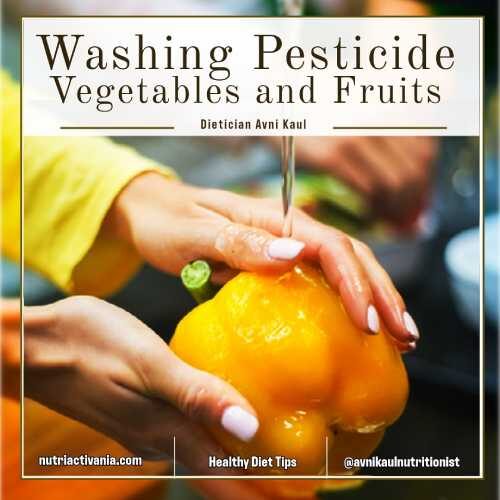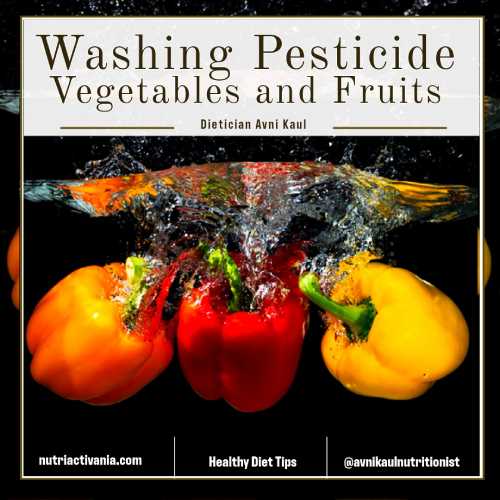And Make it Safe for Your Family, Shares Dietician Avni Kaul
In today’s world, being conscious about health means paying close attention to what we eat. While fruits and vegetables are vital for a healthy diet, they often come with an unwelcome addition: pesticides.
These chemicals, used to protect crops from pests, fungi, and weeds, have been known to pose health risks since the 1960s. The good news is that with the right methods, you can effectively reduce or even eliminate pesticide residues from your produce.
Expert nutritionist and dietitian for gastrointestinal health in Delhi, Avni Kaul, shares a few tips and tricks to remove pesticides from your vegetables and fruits
What are pesticides and why are they toxic to humans and plants?
A pesticide is a chemical or biological agent used to control pests that can harm crops, food stores, or homes. Examples include insecticides for insects, herbicides for weeds, rodenticides for rodents, and fungicides for fungi. Pesticides help protect crops but can also pose health risks to humans.
These risks range from short-term effects like headaches and nausea to long-term impacts such as cancer, Alzheimer’s, Parkinson’s, and reproductive harm. Even organic produce uses pesticides, though they are derived from natural substances instead of synthetic ones.
Glyphosate (Roundup) disrupts hormones and may cause cancer, liver disease, and birth defects. Atrazine affects hormones too, leading to fetal problems and heart issues.
Chlorpyrifos can harm nerves and development, while Heptachlor is linked to cancer and nervous system issues. Many countries now ban these chemicals due to health risks.
What are some of the tips to remove pesticides from agricultural produce?
Some of the tips to remove pesticides are:
Wash Them Properly
The first step in ensuring the safety of your fruits and vegetables is thorough washing, even if they are labeled organic. Bagged salads, often deemed pre-washed, still harbor bacteria like E. coli and residual chemicals from processing, such as chlorine and bleach, necessitating re-washing before consumption.
Studies suggest that washing produce with a 2% salt water solution effectively removes a significant portion of contact pesticide residues typically found on their surfaces. Cold water alone can eliminate approximately 75 to 80 percent of these residues.
Pay particular attention to fruits like grapes, apples, guava, plums, mangoes, peaches, and pears, as well as vegetables such as tomatoes, eggplants, and okra, as they tend to retain residues in their crevices. Washing, blanching, and cooking effectively can remove pesticide residue from green veggies.
Soak in Vinegar
Another way to effectively remove pesticides from fruits and vegetables is by soaking them in a solution of water and vinegar, using three parts water to one part vinegar.
This home remedy involves soaking the produce for ten minutes before rinsing thoroughly with water.
Vinegar not only helps eliminate pesticide residues but also acts against bacteria and fungi.
Adding lemon juice to the vinegar solution increases its acidity, enhancing the cleansing process.
It is important to note that while this method is generally effective, porous fruits like berries should be soaked briefly to avoid becoming too soggy.
Blanching and Peeling
Another way to reduce pesticide residues from fruits and vegetables is through blanching and peeling. Blanching involves briefly immersing vegetables in hot water or steam after thorough pre-washing, which effectively removes surface pesticides.
Peeling is recommended for fruits with crevices where residue can accumulate. Additionally, trimming excess fat and skin from meat can eliminate pesticide traces absorbed by animals. These methods, combined with processing steps like concentration and dehydration, further minimize pesticide residues in food.
Baking Soda
Studies reveal that baking soda, when used in an ultrasonic cleaning solution with water, can effectively remove up to 92% of pesticide residues from cabbage.
This simple homemade remedy, combining baking soda, lemon juice, and water, not only cleans fruits and vegetables but also preserves their natural flavors.
By spraying the solution on produce, letting it sit briefly, and rinsing thoroughly, you can significantly reduce pesticide exposure before consumption.
Grapefruit Seed Extract
Grapefruit Seed Extract (GSE) is a potent natural remedy for eliminating bacteria, fungi, and parasites from fruits and vegetables, effectively removing pesticides.
It combats over 800 viral and bacterial species without side effects, making it a trusted choice for cleaning produce and maintaining health.
These are a few quick and effective methods to ensure your fruits and vegetables are safe from pesticide residues: thorough washing with salt water, soaking in vinegar solution, blanching and peeling, using baking soda solutions, and incorporating grapefruit seed extract.
These steps help mitigate health risks associated with pesticide exposure, promoting safer consumption for you and your family.





